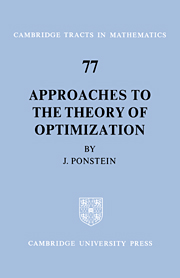Book contents
- Frontmatter
- Contents
- Preface
- List of symbols
- 1 Approaching optimization by means of examples
- 2 An intuitive approach to mathematical programming
- 3 A global approach by bifunctions
- 4 A global approach by conjugate duality
- 5 A local approach for optimization problems in Banach spaces
- 6 Some other approaches
- 7 Some applications
- Appendix A
- Appendix B
- Appendix C
- Appendix D
- Appendix E
- Comments on the text and related literature
- References
- Index
- Frontmatter
- Contents
- Preface
- List of symbols
- 1 Approaching optimization by means of examples
- 2 An intuitive approach to mathematical programming
- 3 A global approach by bifunctions
- 4 A global approach by conjugate duality
- 5 A local approach for optimization problems in Banach spaces
- 6 Some other approaches
- 7 Some applications
- Appendix A
- Appendix B
- Appendix C
- Appendix D
- Appendix E
- Comments on the text and related literature
- References
- Index
Summary
Perhaps the title of this book should have been, somewhat in the style of past times, ‘Some approaches towards the theory of optimization, with an emphasis on the topological aspects, ignoring combinatorial problems and almost ignoring combinatorial tools, not going into the algorithmic and numeric problems of effectively finding solutions to problems, yet meant as a contribution to applied and even practical mathematics.’
Even this does not make it sufficiently clear what is going on in the book and what is not. It is worth saying a few words about the omissions. Convex processes are not treated, problems involving more than one objective to be optimized are only touched on lightly. Of game theory, only the simplest model is considered. Since, as far as Lagrangian duality is concerned, any practitioner wants a nonzero multiplier attached to the objective function, theorems where this multiplier is allowed to be zero do not receive any attention. Similarly the reader will not find anything about regularity conditions, which apart from being sufficient are also necessary for a whole class of problems (rather than for a single one). This is because when we try to solve any one problem out of such a class, those conditions may well be too strong for practical purposes.
- Type
- Chapter
- Information
- Approaches to the Theory of Optimization , pp. ix - xPublisher: Cambridge University PressPrint publication year: 1980



